Photos of university / #uofwaterloo
Global climate change is considered by many scientists and high-level decision makers in government, business and civil society to be one of the most pressing challenges facing humankind.
The University of Waterloo’s groundbreaking new Master of Climate Change (MCC) program will be the first of its kind in Canada and will join only a handful of programs worldwide to focus on the multiple ways climate change interacts with society and the environment.
The MCC program provides a unique educational experience to students interested in the rapidly evolving fields of climate change research and diverse career paths in climate change science, policy and management. The program is designed with the flexibility to meet the needs of recent graduates who endeavour to become part of the first generation of climate change professionals by building on their undergraduate degree with advanced training and experience specific to climate change. The program will also be of interest to mid-career professionals looking to upgrade their current knowledge and skills to take on the challenges climate change poses to their field.
Core Courses
- Climate Change: Physical Science Basis
- Climate Change Vulnerability and Adaptation
- Climate Change Mitigation
Electives
- Climate Prediction, Modeling and Scenarios
- Climate and Society
- Advanced Climatic Change Adaptation
- Climate Change, Natural Hazards and Disaster Risk Reduction
- Land Use and the Carbon Cycle
- Climate Policy, Law and Institutions
- Climate Compatible Development
- Environmental Change and Remote Sensing
- Remote Sensing and Earth System Science
- Micrometeorology
- Paleolimnology
- Energy and Sustainability
- Global Health (online delivery)
- Site Planning and Design Studio
- Environmental Finance
Open Electives
- Climate change and international development
- Climate change and water
- Climate change and geomatics
- Climate change governance
- Climate change and sustainable tourism
- Climate change and business
- Climate change and Northern development
- Climate change and biodiversity conservation
- Climate change and planning
Requirements
- Students must have completed a four‐year honours Bachelor degree (or equivalent) in a humanities, social science, health, engineering, science, or business discipline with an overall average of at least 75% in the final 20 courses (or last 2 years).
- In some instances, students with a three‐year degree are accepted into a "qualifying period" whereby they take one or two terms of prescribed undergraduate courses and then, if grades on these are high enough (usually 75%), the student is allowed to proceed into the MCC program. Please contact the Department Coordinator for more information on qualifying years.
- Résumé
- Supplementary information form
- Transcript(s)
- 3 references, at least 2 of them are academic.
- IELTS 7.5; Internet-Based TOEFL (iBT) 100 overall
Scholarships
- International Master's (IMSA) & International Doctoral Student Awards (IDSA)
- Ontario Graduate Scholarship (OGS)
- Vanier Canada Graduate Scholarship (CGS)
The University of Waterloo offers a comprehensive program focused on Climate Change, designed to equip students with the essential knowledge and skills to understand and address one of the most pressing global challenges. The program covers a broad range of topics including the science of climate change, its environmental, economic, and social impacts, and strategies for mitigation and adaptation. Students benefit from a multidisciplinary approach, integrating insights from environmental science, policy studies, economics, and engineering. The curriculum includes coursework on climate modeling, sustainable development, energy systems, environmental law, and policies aimed at reducing greenhouse gas emissions. Alongside theoretical learning, students engage in practical projects, research, and internships that provide real-world experience. The faculty comprises experts in climate science, environmental policy, and sustainable development, offering mentorship and guidance throughout the program. The university emphasizes experiential learning through collaborations with industries, government agencies, and non-profit organizations to prepare graduates for careers in climate change research, policy-making, consulting, and advocacy. Moreover, the program encourages students to participate in international initiatives and conferences to broaden their understanding of climate issues on a global scale. Graduates of this program are well-equipped to contribute to innovative solutions for reducing climate impacts, promoting sustainable practices, and developing policies that support resilience and adaptation in communities worldwide. The program aims to foster critical thinking, interdisciplinary collaboration, and leadership qualities, ensuring that graduates can effectively respond to evolving climate challenges in diverse professional contexts.


